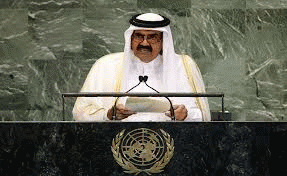What an entrance at the UN General Assembly in New York; Sheikh Hamad bin Khalifa al-Thani called for an Arab coalition of the willing-style invasion of Syria, no less.[1]
What he means by "Arab countries" is the petro-monarchies of the Gulf Counter-Revolution Club (GCC), previously known as Gulf Cooperation Council -- with implicit help from Turkey, with which the GCC has a wide-ranging strategic agreement. Every shisha house in the Middle East knows that Doha, Riyadh and Ankara have been weaponizing/financing/providing logistical help to the various strands of the armed Syrian opposition engaged in regime change.
The Emir even quoted a "similar precedent" for an invasion, when "Arab forces intervened in Lebanon" in the 1970s. By the way, during a great deal of the 1970s the Emir himself was engaged in more mundane interventions, such as letting his hair down alongside other Gulf royals in select Club Med destinations, as this photo attests (he's the guy on the left).

So is the Emir now preaching an Arab version of the R2P ("responsibility to protect") doctrine advanced by The Three Graces of Humanitarian Intervention (Hillary Clinton, Susan Rice and Samantha Power)?
This is certainly bound to go down well in Washington -- not to mention Ankara and even Paris, considering French president Francois Hollande has just called for UN protection of "liberated zones" in Syria.
As for the Emir's Lebanon precedent, that's not exactly uplifting, to say the least. The so-called Arab Deterrent Force of 20,000 soldiers that entered Lebanon to try to contain the civil war overstayed its welcome by no less than seven years, turned into a Syrian military occupation of northern Lebanon, left officially in 1982 and still the civil war kept raging.
Imagine a similar scenario in Syria -- on steroids.
A "pretty influential guy"
As for the Emir's humanitarian -- not to mention democratic -- ardor, it's enlightening to check out what US President Barack Obama thinks about it. Obama -- who defines the Emir as a "pretty influential guy" -- seems to imply that even though "he himself is not reforming significantly" and "there's no big move towards democracy in Qatar," just because the emirate's per capita income is humongous, a move towards democracy is not so pressing.
So let's assume the Emir is not exactly interested in turning Syria into Scandinavia. That opens the way to an inevitable motive -- connected to, what else, Pipelineistan.
Vijay Prashad, author of the recent Arab Spring, Libya Winter, is currently writing a series on the Syria Contact Group for Asia Times Online. He got a phone call from an energy expert urging him to investigate "the Qatari ambition to run its pipelines into Europe." According to this source, "the proposed route would have run through Iraq and Turkey. The former transit country is posing to be a problem. So much easier to go north (Qatar has already promised Jordan free gas)."
Even before Prashad concludes his investigation, it's clear what Qatar is aiming at; to kill the US$10 billion Iran-Iraq-Syria gas pipeline, a deal that was clinched even as the Syria uprising was already underway.[2]
Here we see Qatar in direct competition with both Iran (as a producer) and Syria (as a destination), and to a lesser extent, Iraq (as a transit country). It's useful to remember that Tehran and Baghdad are adamantly against regime change in Damascus.
The gas will come from the same geographical/geological base -- South Pars, the largest gas field in the world, shared by Iran and Qatar. The Iran-Iraq-Syria pipeline -- if it's ever built -- would solidify a predominantly Shi'ite axis through an economic, steel umbilical cord.
Qatar, on the other hand, would rather build its pipeline in a non-"Shi'ite crescent" way, with Jordan as a destination; exports would leave from the Gulf of Aqaba to the Gulf of Suez and then to the Mediterranean. That would be the ideal plan B as negotiations with Baghdad become increasingly complicated (plus the fact the route across Iraq and Turkey is much longer).
(Note: You can view every article as one long page if you sign up as an Advocate Member, or higher).






